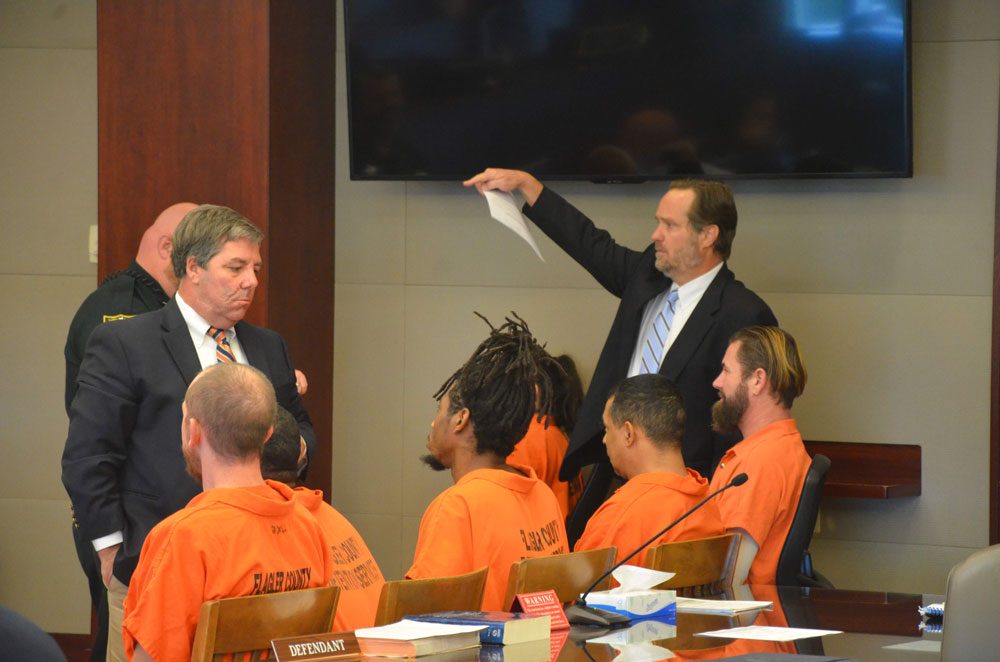
A Senate panel on Tuesday threw its support behind a bill that would loosen mandatory minimum sentencing laws for some drug-trafficking offenses, a proposed change that ran into opposition from law enforcement officials.
While advocates called the proposal a “modest step” toward sentencing reform, a representative of the Florida Police Chiefs Association raised concerns about the bill not being tough enough.
The proposal, sponsored by Senate budget chief Rob Bradley, would allow judges to consider shorter sentences for drug-trafficking defendants who meet certain criteria. However, the measure would not affect drug-trafficking offenses that carry a mandatory minimum of 25 years in prison.
“What this bill says is that there will be a judge … who will review all the particular facts, will make a decision on what is right in that particular case,” Bradley, a former prosecutor, said.
But Gary Hester, a Florida Police Chiefs Association lobbyist, expressed concern about a provision in the bill that would allow judges to have discretion over cases involving people who are caught with 400 grams of cocaine, whom Hester called “high-level traffickers.”
“Someone would have to possess 150 kilograms, which is over 330 pounds, of cocaine to actually be assured they are going to prison under the current statute,” Hester said.
Championing his bill (SB 346), Bradley argued that state lawmakers can make an impact on the lives of drug addicts by reforming sentencing laws.
“Let me just talk to my friends in the building for just a second. It is time to do this. We’ve talked about it for a long time,” Bradley told the committee. “(Let’s) get out of our corners and let’s do something right for the people of the state of Florida.”
He added his bill “may just make justice a little bit brighter.”
To depart from mandatory minimum sentences laid out in state law, judges would determine if a defendant meets certain criteria.
To qualify, a defendant could not have prior felony convictions in which force or violence was used. Defendants would also need to “truthfully” provide law enforcement with all of the information and evidence associated with their cases, and they would not be able to be in possession of a firearm at the time of their crimes.
“State prison needs to be reserved for the worst of the worst,” Bradley, a Fleming Island Republican, said. “Somewhere along the way we have gotten in the habit of people going to state prison for things that in other countries, and in other states, they would not be going to state prison.”
Bradley’s bill would also set a maximum incarceration time of 12 months for people who buy or are found in possession of less than two grams of a controlled substance, other than fentanyl.
The criminal justice committee unanimously approved the measure, which faces two more committee stops before a full Senate vote. A companion bill has not been filed yet in the House.
Greg Newburn, state policy director for Families Against Mandatory Minimums, said the proposal was a “modest step” toward making Florida’s criminal justice system better.
The proposal “is a toe in the water” while “other states are doing cannonballs into the pool” by loosening mandatory minimum sentencing laws, Newburn told the committee.
“Don’t listen to the Chicken Little nonsense that, without stiff mandatory minimums, drugs would be out of control. They are out of control now,” an obviously frustrated Newburn said, following Hester’s testimony.
Sen. Randolph Bracy, an Orlando Democrat who has pushed criminal justice reforms since he was elected to the Legislature in 2012, asked Bradley to consider giving judges discretion over cases that also include sentences of at least 25 years in prison.
Bracy pointed to a state law requiring a 25-year mandatory minimum sentence for individuals who are convicted of possessing 28 grams or more of drugs that include heroin, oxycodone or hydrocodone.
“I would just ask that you reconsider the 25-year threshold,” he said. “There are still people who are users that would meet that threshold.”
In addition to changing some drug-trafficking sentencing laws, Bradley’s bill also includes language that would require law enforcement officers to record all interrogations of an individual in their custody.
If an interrogation is not recorded, officers would be required to provide a written report documenting why the recording was not made.
Sen. Jason Pizzo, a North Miami Beach Democrat who is a former prosecutor, asked Bradley to consider allowing law enforcement officers to use their cell phones to make video or audio recordings. Pizzo suggested clarifying that the officers would not have to give prosecutors text messages or other information on their cell phones.
Bradley said he was open to considering such a provision, but added he wants more information about potential privacy concerns.
–Ana Ceballos, News Service of Florida





























Lnzc says
You say drugs are out of control now,so you are going to make jail time less to improve it.
How stupid would that be,too many politicians making money from drugs.
Chad says
Yeah because the majority of people that are being locked up are harmless. They are not a threat to anyone. Yeah your correct the shitty politicians and the law makers are making money off of the privatization of prisons who are mostly drug addicts sentenced to life sentences when there was no victim in the crime. Those are the real criminals. In case u haven’t noticed why u never see big dealers get busted it’s because Its our own govt that’s bringing the shit in. Wake up
larry krasner says
Every time a hooked user robs a store, etc., the pusher who got him/her addicted should be charged as an accessory before the fact.